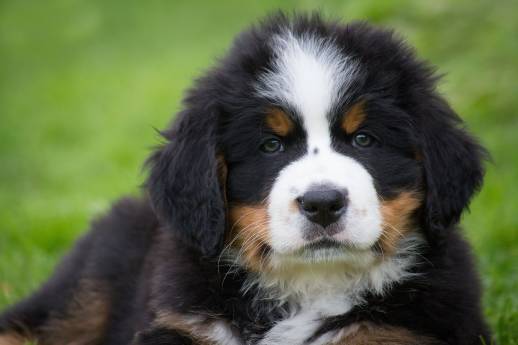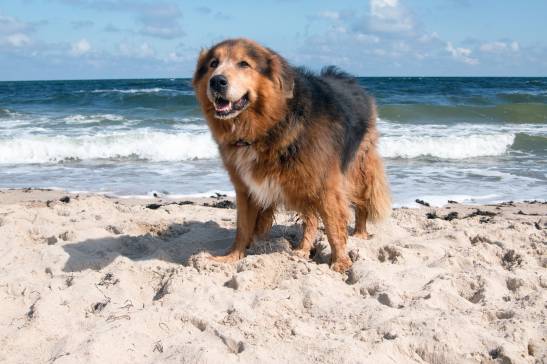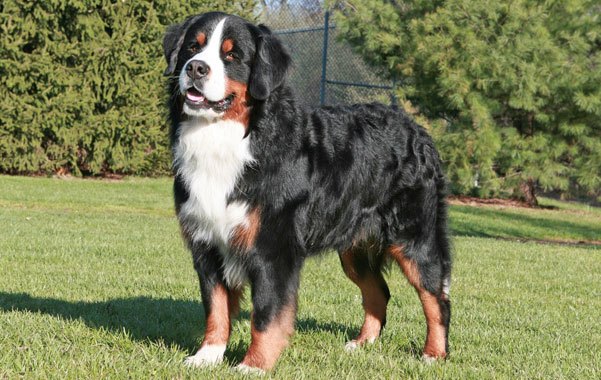Connect with a verified veterinarian in minutes. Licensed vets are available 24/7 to answer your questions. No need to worry about your furry family member.
Are you thinking about adopting a large dog? Then you may want to consider the St. Bernese! If you’re not familiar with this dog breed, that’s OK!
We’ve put together some information about the St. Bernese dog, so you can learn more about these amazing, very large dogs!
What is a Saint Bernese Dog?
The Saint Bernese dog is a hybrid mixed breed that comes from the cross a St. Bernard and a Bernese Mountain Dog. Needless to say, the St. Bernese is a large dog!
We don’t know much about the history of this hybrid dog breed; however, it’s thought they were first bred in the 1990s. That was a time when breeders were experimenting with crossing purebred dog breeds.
While we may not have much information about the St. Bernese dog, we know quite about the dog’s parents! We’ll start with the St. Bernard.
The St. Bernard is a very large working dog that was originally bred in Switzerland at the St. Bernard Pass. A monastery and hospice were started in this area back in 962 AD by Archdeacon Bernard de Menthon. The pass is notoriously treacherous, which is why St. Bernard founded the hospice here. The hospice was to serve as a place where travelers could stop and rest after coming off the pass.
The St. Bernards were bred by the monks to help find lost travelers. Dealing with the severe winters in this area, the dogs were bred to be large and able to stay warm in this environment. With their warm, gentle personality, the dogs were well-suited to this work. Today, the St. Bernard has become a beloved family companion.
The other parent of the Bernese is the Bernese Mountain Dog. The Bernese Mountain Dog is also a large working dog. They also originally came from Switzerland, where they were bred to pull small carts, herd cattle, and were also used as guard dogs.
The Bernese Mountain Dog is very friendly and calm. They’re known for their tri-color coat and the white “Swiss cross” on their chest. The dogs are loyal, loving, intelligent, and eager to please. This makes them easy to train.
It’s been said these dogs sometimes have a silly side! You may notice this when the dog plays with you and your family. Speaking of family, Bernese Mountain Dogs love kids and being with their families most of the time.
Hybrid Dogs & Genetics
The St. Bernese has some amazing parents! However, what is their St. Bernese offspring like? The answer isn’t very simple. That’s because a hybrid dog breed doesn’t have a standard when it comes to appearance or other traits.
Not many people realize this, but a hybrid dog is never a straight 50/50 mix of his parents. Instead, the dog randomly inherits genes from the parents. But there’s no way to predict what genes the hybrid will inherit.
When it comes to the hybrid puppies in the same litter, you may find them each a bit different. Some may resemble their St. Bernard parent, while others look more like their Bernese Mountain Dog parent. Or there may be puppies that look like a mix of both parents. It’s really hard to say. Their personalities are also hard to determine. It all depends on the genes they inherit.
But if a breeder uses responsible breeding practices, there is a higher chance the puppies will have the best traits of both parents. They’ll also be healthier.
So, when looking for a St. Bernese to adopt, don’t be surprised if you find dogs with a broad range of features. There’s no set standard for this hybrid dog breed.

Review symptoms, medications & behavior to keep your pets healthy with a Vet Online in just minutes.
Ask a Vet Live NowSt. Bernese Appearance
The first thing you’ll notice about a St. Bernese is that they’re very large dogs! These beautiful dogs have large heads, thick necks, and wide chests. Their limbs are solid and strong. The dog’s face has deep-set brown eyes that may have a somewhat serious, kind expression. The dogs also have large paws and long tails.
These hybrid dogs also have thick double coats (a top coat and a thick undercoat) that protect them in colder weather. The fur is straight and quick thick and may be tri-colored (black, brown, and white). However, there are some dogs that are white and brown. They may also have a white tip on their tail. The fur may come in cream, Isabella, pied (black & white), black, white, and brown.
St. Bernese have strong, muscular bodies. They may have eyes that are brown or amber, with a black nose. These are beautiful dogs—there’s no doubt about that!
St. Bernese Personality & Temperament
St. Bernese dogs are known for being very laidback! They don’t become agitated easily and just take everything as it comes along. They remain calm and collected and rarely lose patience or their temper. These hybrid dogs are gentle and extremely tolerant with kids, too. Even so, kids should never be left alone with these or any other dogs. Remember, these are large dogs may cause an injury by accident.
St. Bernese dogs are also very protective and aware of their surroundings. They will watch for intruders or any problems. The dogs tend to be extremely loyal and loving with their families. However, they never try to be dominant or aggressive. However, their sheer size is usually an excellent deterrent to intruders!
St. Bernese dogs can be somewhat stubborn. This comes from their St. Bernard parent. The best way to deal with this is to use plenty of patience and using positive reinforcement training methods.
In addition, these dogs take longer to mature than other dogs. If you have a puppy, he may seem a bit like Peter Pan when it comes to his personality and temperament! And that’s OK!
St. Bernese Exercise Requirements
The St. Bernese is a very active dog that requires a good amount of exercise every day. While they’re not highly active, they still have a lot of energy that needs to be used up. These dogs love to walk or even run with you.
Because they’re so easygoing, these dogs are great to take to the dog park. There, St. Bernese usually mix well with other dogs. They love to play with their doggie friend! The dog park is also an excellent opportunity for training and socializing the dog with other dogs and humans.
These hybrid dogs are great for active families. If you love hiking, this is the dog to take along! They’ll be quite happy tramping with you almost anywhere!
Because of their large size, St. Bernese dogs are not the right choice for anyone living in an apartment. The dogs need plenty of room to move around and play. So, it’s best if they have a larger home with a large fenced backyard.
Expect to spend at least 60 minutes a day exercising your St. Bernese, though more exercise is better! You can divide that 60 minutes between training sessions, walking, and playtime.
St. Bernese Health Issues
St. Bernese are large dogs, standing between 26 to 35 inches and weighing between 110 and 180 lbs. Unfortunately, because of their size, these dogs have a shorter life expectancy of between 8-10 years.
St. Bernese dogs are prone to developing certain health issues, including the following:
- Hip dysplasia
- Bloat
- Malignant histiocytosis
- Osteosarcoma
- Von Willebrand’s disease
- Spinal problems
- Hyperthyroidism
- Allergies
- Obesity
- Eye infections
- Eye problems
One of the best ways to keep your St. Bernese hybrid dog healthy is to ensure he has regular checkups with the vet. Why is this so important? Through regular checkups, the vet can spot new health issues before they become more serious. Many health problems are easier to treat and cure when found early. If these conditions are left untreated, they can become more severe. By this time, the condition may no longer even be treatable. So, early diagnosis and treatment can make a huge difference to your dog’s health. As you take your dog for checkups, make sure he gets all his required vaccinations.
If you are concerned your fur baby could develop serious health issues, then you may want to consider purchasing pet health insurance. There are many pet health insurance policies available now. Some policies cover regular checkups, treatments, medications, vaccinations, and more. A pet health insurance policy can be a huge financial help if a dog becomes seriously ill.
St. Bernese & Training
There’s no question that St. Bernese are highly intelligent dogs! However, they can sometimes be a bit stubborn. This is normal with smart dogs. Even so, it’s essential for pet parents to ensure their dogs are trained and socialized from a young age. This is especially important for large dogs. You want to avoid having a large, slobbery dog that jumps up on people!
St. Bernese dogs respond best to positive reinforcement training methods. So, have plenty of treats and praise on hand when training your canine companion.
Another important note is that St. Bernese dogs don’t do well in warm climates. Their purebred parents were bred to live in the high alpine mountains of Switzerland, where temperatures are cool even in the summer. So, these dogs do well where it’s cold. However, they can’t deal with heat and humidity because of their thick, dense coats.
Remember that your large dogs also need proper socialization. Ideally, training and socialization should start at the puppy stage and continue from there. Pet parents must be committed to on-going training and socialization with these very large, lovely dogs.
St. Bernese Care & Maintenance
St. Bernese dogs have a very dense coat, which is inherited from both purebred parents. With their long, straight, dense coats, the dogs require plenty of brushing. The fur can easily tangle and mat, which becomes uncomfortable (and sometimes painful) for the dog. Brushing also spreads the dog’s natural oil over his coat, making it look shiny and healthy.
In addition, these dogs do shed quite a bit. So, daily brushing is crucial; it helps to keep shed fur off your clothes and furniture. It’s best to use a strong bristle brush daily to keep the St. Bernese’s fur healthy and tangle-free.
You may be afraid to even think of giving one of these large dogs a bath! We don’t blame you! However, you’ll be happy to learn that St. Bernese don’t need bathing very often. When you do give your dog a bath, it’s best to choose a shampoo that’s mild and gentle on the skin.
St. Bernese Diet
St. Bernese diets have an appetite to match their size! They require high-quality dog food that provides nutrients for giant, active dog breeds.
Your fur baby will need between 3-4 cups of dog food a day. These can be divided into two or three meals throughout the day.
Are St. Bernese Dogs Good for Families?
St. Bernese dogs are great for families, including those that have children. The dogs protect the family and have a gentle, easygoing nature. And they love to play with kids and adults alike!
One thing to keep in mind is that these are large dogs. They usually remember their size; however, in the midst of having a ton of fun may forget they’re so much larger than you or your kids. A dog this size may easily cause an unintended injury.
So, it’s essential these dogs are properly trained and socialized. They also need somewhere to run (like a backyard) where they can have zoomies and other fun! And never leave your kids unattended with this or any other dog.
Do St. Bernese Dogs Get Along with Other Pets?
Here, too, the St. Bernese excels! Despite being such large dogs, they are known to be very accepting of other dogs and pets.
They truly love having a companion dog (of their own). And they usually get along pretty well with cats and other small animals.
Summing It Up
So, there you have it! The St. Bernese is a great family companion that will love you and stay loyal fur-ever! They want nothing more than to stay with their loved ones and have fun. These are large hybrid dogs that have even larger hearts!
We hope this guide has given you the information to learn if the St. Bernese is the right dog for you and your family! If you choose a St. Bernese, you will have a friend and companion with whom to enjoy life!
Connect with a verified veterinarian in minutes. Licensed vets are available 24/7 to answer your questions. No need to worry about your furry family member.

Kyoko
Kyoko is from a family of 3 and moved to New York with her parents and siblings when she was 13. Kyoko is fond of spending a great amount of time with pets, specifically her beagle Luna and cat Missy. Her boyfriend often complains that she spends too much time giving attention to their animals. Kyoko has written dozens of articles concerning pets and is aiming at owning a pet shop one day!
Review symptoms, medications & behavior to keep your pets healthy with a Vet Online in just minutes.
Ask a Vet Live Now




